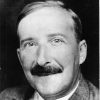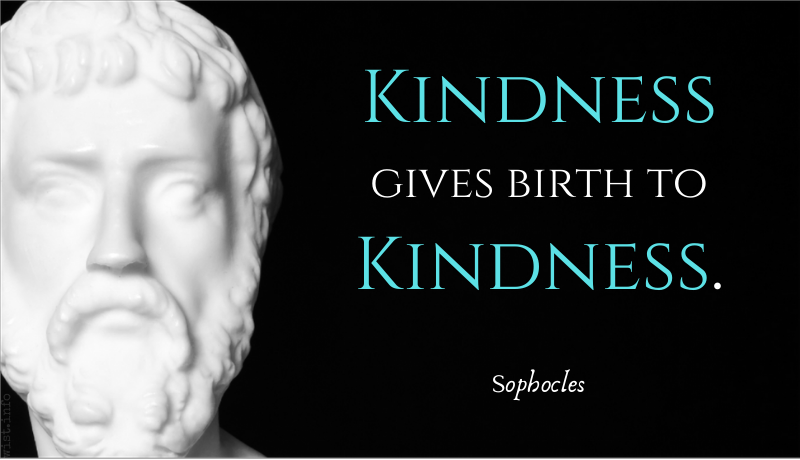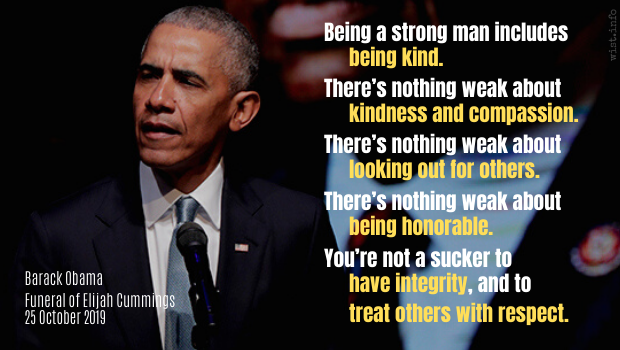ADRIANA: A wretched soul bruised with adversity
We bid be quiet when we hear it cry,
But were we burdened with like weight of pain,
As much or more we should ourselves complain.William Shakespeare (1564-1616) English dramatist and poet
Comedy of Errors, Act 2, sc. 1, l. 34ff (2.1.34-37) (1594)
(Source)
Quotations about:
compassion
Note not all quotations have been tagged, so Search may find additional quotes on this topic.
What a lamentable cuss man iz, he pittys hiz nabors misfortunes, bi calling them judgments from heaven.
[What a lamentable cuss man is: he pities his neighbors’ misfortunes, by calling them judgments from heaven.]Josh Billings (1818-1885) American humorist, aphorist [pseud. of Henry Wheeler Shaw]
Everybody’s Friend, Or; Josh Billing’s Encyclopedia and Proverbial Philosophy of Wit and Humor, ch. 144 “Affurisms: Gnats” (1874)
(Source)
We are afraid of having and showing a small mind, and we are not afraid of having and showing a small heart.
Joseph Joubert (1754-1824) French moralist, philosopher, essayist, poet
Pensées [Thoughts], 1805 entry [tr. Auster (1983)]
(Source)
I could not find an analog in other translations of the Pensées.
This increase in the life span and in the number of our senior citizens presents this Nation with increased opportunities: the opportunity to draw upon their skill and sagacity — and the opportunity to provide the respect and recognition they have earned. It is not enough for a great nation merely to have added new years to life — our objective must also be to add new life to those years.
John F. Kennedy (1917-1963) US President (1961-63)
“Special Message to the Congress on the Needs of the Nation’s Senior Citizens” (1963-02-21)
(Source)
It is well to give when asked, but it is better to give unasked, through understanding.
Kahlil Gibran (1883-1931) Lebanese-American poet, writer, painter [Gibran Khalil Gibran]
The Prophet, “Giving” (1923)
(Source)
Yes; quaint and curious war is!
You shoot a fellow down
You’d treat if met where any bar is,
Or help to half-a-crown.
There will always be a lost dog somewhere that will prevent me being happy.
[Il y aura toujours un chien perdu quelque part qui m’empêchera d’être heureux.]
I have known sorrow — therefore I
May laugh with you, O friend, more merrily
Than those who never sorrowed upon earth
And know not laughter’s worth.I have known laughter — therefore I
May sorrow with you far more tenderly
Than those who never guess how sad a thing
Seems merriment to one heart’s suffering.Theodosia Pickering Garrison (1874-1944) American poet
“Knowledge,” The Century Magazine (1900-08)
(Source)
Surely I wept, leaning upon a ledge
Of the rough rock, so that my escort said,
“Art thou then weak and foolish like the rest?
Here lives true piety when pity dies.
But who more wicked than the man who yields
To sorrow place where judgment is divine!”[Certo io piangea, poggiato a un de’ rocchi
del duro scoglio, sì che la mia scorta
mi disse: “Ancor se’ tu de li altri sciocchi?
Qui vive la pietà quand’è ben morta;
chi è più scellerato che colui
che al giudicio divin passion comporta?]Dante Alighieri (1265-1321) Italian poet
The Divine Comedy [Divina Commedia], Book 1 “Inferno,” Canto 20, l. 25ff (20.25-30) (1309) [tr. Johnston (1867)]
(Source)
Virgil chides Dante for weeping over the fate of the damned in the third circle, fourth bolgia, who themselves are also weeping.
Maybe. There are a lot of scholarly debates over some of the wording and pronoun references here. Some translators play off the word pietà meaning both "pity" and "piety" in Italian. It's also possible that, rather than the final lines condemning Dante for letting his compassion defy an acceptance of God's judgment, they refer to the sinful arrogance of fortune-tellers (the group being punished here) in believing they can question or change God's decrees for the future.
(Source (Italian)). Alternate translations:
Leaning against the rock, I so great grief
Express'd, that thus my Guide to me apply'd;
Are you among the weak to be arrang'd?
When without life, 'tis here Compassion lives.
Who can more wicked be estem'd than He
Who thinks that the divine Decrees are wrong.
[tr. Rogers (1782), l. 22ff]
Their laboring reins the falling tear bedew'd,
Deep struck with sympathetic woe I stood,
'Till thus the Bard my slumb'ring reason woke: --
"Dar'st thou the sentence of thy God arraign;
Or with presumptuous tears his doom profane?
Say, can thy tears his righteous doom revoke?
[tr. Boyd (1802), st. 5]
Against a rock
I leant and wept, so that my guide exclaim’d:
“What, and art thou too witless as the rest?
Here pity most doth show herself alive,
When she is dead. What guilt exceedeth his,
Who with Heaven’s judgment in his passion strives?
[tr. Cary (1814)]
Certes I wept so, leaning toward a breast
Of that hard shelf, mine escort chiding said:
"Why wilt thou yet be foolish as the rest?
Here pity best hath life when wholly dead:
What guiltier wretch than he whose grief avowed
Impugns Almighty Judgment?
[tr. Dayman (1843)]
Certainly I wept, leaning on one of the rocks of the hard cliff, so that my Escort said to me: "Art thou, too, like the other fools?
"Here pity lives when it is altogether dead. Who more impious than he that sorrows at God's judgment?"
[tr. Carlyle (1849)]
Sore I lamented, leaning on a rock,
A rough-planed crag, until my guide addressed
The words -- "Are you, too, foolish like the rest?
Here Pity is alive, e'en when quite dead.
And what can be more wicked than the man
Who 'gainst heaven's justice in his passion ran.
[tr. Bannerman (1850)]
Truly I wept, leaning upon a peak
Of the hard crag, so that my Escort said
To me: "Art thou, too, of the other fools?
Here pity lives when it is wholly dead;
Who is a greater reprobate than he
Who feels compassion at the doom divine?
[tr. Longfellow (1867)]
Of a truth I began to weep leaning against one of the rocks of the hard cliff, so that my Escort said to me: "Art thou yet among the other foolish ones? Here pity lives when it is right dead. Who is more wicked than he who brings passion to the judgement of God?"
[tr. Butler (1885)]
Surely I wept, supported on a rise
Of that fire-hardened rock, so that my guide
Said to me: "Thou too 'mongst the little wise?
Here Pity lives alone, when it hath died.
Who is the greater scelerate than he
Who lets his passion 'gainst God's judgment bide?"
[tr. Minchin (1885)]
Truly I wept, leaning on one of the rocks of the hard crag, so that my Guide said to me, “Art thou also one of the fools? Here pity liveth when it is quite dead. Who is more wicked than he who feels compassion at the Divine Judgment?"
[tr. Norton (1892)]
I wept indeed, leaning against a rock on the stony ridge, so overcome, that my Guide said to me: "Art thou too like the other fools? Here pity liveth but when it is truly dead. Who is more lost to righteousness than he whose pity is awakened at the decree of God?"
[tr. Sullivan (1893)]
Certain, I wept, supported on a comer
Of the hard spur, so freely that my escort
Said to me : "Art thou still among the simple?
Here piety lives when wholly dead is pity.
Who is than he more desperately wicked
Who to the doom divine doth bring compassion?
[tr. Griffith (1908)]
I wept indeed, leaning on one of the rocks of the rugged ridge, so that my Escort said to me: "Art thou too as witless as the rest? Here pity lives when it is quite dead. Who is more guilty than he that makes the divine counsel subject to his will?"
[tr. Sinclair (1939)]
Truly I wept, leant up against the breast
Of the hard granite, so that my Guide said:
"Art thou then still so foolish, like the rest?
Here pity lives when it is rightly dead.
What more impiety can he avow
Whose heart rebelleth at God's judgment dread?
[tr. Binyon (1943)]
Truly I wept, leaned on the pinnacles
Of the hard rock; until my guide said, "Why!
And art thou too like all the other fools?
Here pity, or here piety, must die
If the other lives; who's wickeder than one
That's agonized by God's high equity?"
[tr. Sayers (1949)]
Certainly,
I wept. I leaned agianst the jagged face
of a rock and wept so that my Guide said: "Still?
Still like the other fools? There is no place
for pity here. Who is more arrogant
within his soul, who is more impious
than one who dares to sorrow at God's judgment?
[tr. Ciardi (1954)]
Truly I wept, leaning on one of the rocks of the hard crag, so that my guide said to me, “Are you even yet among the other fools? Here pity lives when it is altogether dead. Who is more impious than he who sorrows at God’s judgment?"
[tr. Singleton (1970)]
Indeed I did weep, as I leaned my body
against a jut of rugged rock. My guide:
"So you are still like all the other fools?
In this place piety lives when pity is dead,
for who could be more wicked than that man
who tries to bend divine will to his own!
[tr. Musa (1971)]
Of course I wept, leaning against a rock
along that rugged ridge, so that my guide
told me: “Are you as foolish as the rest?
Here pity only lives when it is dead:
for who can be more impious than he
who links God's judgment to passivity?
[tr. Mandelbaum (1980)]
I certainly wept, supported on one of the rocks
Of the projecting stone, so that my escort
Said to me: "Are you too like the other fools?
Here pity is alive when it is dead:
Who is more criminal than he who suffers
Because he does not like the divine judgement?
[tr. Sisson (1981)]
Truly I wept,
Leaning on an outcrop of that rocky site,
And my master spoke to me: "Do you suppose
You are above with the other fools even yet?
Here, pity lives when it is dead to these.
Who could be more impious than one who'd dare
To sorrow at the judgment God decrees?"
[tr. Pinsky (1994)]
Surely I wept, leaning on one of the rocks of the hard ridge, so that my guide said to me: “Are you still one of the other fools?
Here pity lives when it is quite dead: who is more wicked than one who brings passion to God’s judgment?"
[tr. Durling (1996)]
Truly, I wept, leaning against one of the rocks of the solid cliff, so that my guide said to me: "Are you like other fools, as well? Pity is alive here, where it is best forgotten. Who is more impious than one who bears compassion for God’s judgement?"
[tr. Kline (2002)]
Of this, be sure: that, leaning on a spur
of that unyielding cliff, I wept. "Are you,"
my escort said, "like them, an idiot still?
Here pity lives where pity's truth is dead.
Who is more impious, more scarred with sin
than one who pleads compassion at God's throne?"
[tr. Kirkpatrick (2006)]
Yes, I wept, leaning against a spur
of the rough crag, so that my escort said:
"Are you still witless as the rest?
Here piety lives when pity is quite dead.
Who is more impious than one who thinks
that God shows passion in His judgment?"
[tr. Hollander/Hollander (2007)]
O yes, I wept, leaning for support on one
Of the solid rocks in the reef, making my guide
Say this: "You're still one of the stupid ones?
Down here, the only living pity is dead.
Is anyone more wicked than the man
Regretting the righteous judgment decreed by God?"
[tr. Raffel (2010)]
I wept indeed, held up in my surprise
By one rock of the ridge. My Escort said:
"You're witless as the rest? Here pity dwells,
But only when it's absolutely dead.
Who is more guilty than he who by spells
And mysteries makes it seem as if divine
Judgment were subject to his will?"
[tr. James (2013)]
The Mediator between Brain and Hands must be the Heart.
[Der Mittler zwischen Hirn und Händen muss das Herz sein.]
Thea von Harbou (1888-1954) German screenwriter, novelist, film director, actress
Metropolis, ch. 5 [Maria] (1925) [tr. (1927)]
(Source)
The novel was written to be the basis for the film by Von Harbou's husband, Fritz Lang. She also collaborated with him on the script. The movie began shooting before the novel was published.
In talking with the growingly restless workers of the city, Maria adds, shortly after the above line:
One will come, who will speak for you -- who will be the mediator between you, the Hands, and the man whose Brain and Will are over you all.
Von Harbau also included an epigraph at the beginning of the novel, which concludes (with a slightly different translation): "The mediator between brain and muscle must be the Heart."
Boundless compassion for all living things is the firmest and surest guarantee of pure moral conduct, and needs no casuistry. Whoever is inspired with it will assuredly injure no one, will wrong no one, will encroach on no one’s rights; on the contrary, he will be lenient and patient with everyone, will forgive everyone, will help everyone as much as he can, and all his actions will bear the stamp of justice, philanthropy, and loving-kindness. On the other hand, if we attempt to say, “This man is virtuous but knows no compassion,” or “He is an unjust and malicious man yet he is very compassionate,” the contradiction is obvious.
[Denn gränzenloses Mitleid mit allen lebenden Wesen ist der festeste und sicherste Bürge für das sittliche Wohlverhalten und bedarf keiner Kasuistik. Wer davon erfüllt ist, wird zuverlässig Keinen verletzen, Keinen beeinträchtigen, Keinem wehe thun, vielmehr mit Jedem Nachsicht haben, Jedem verzeihen, Jedem helfen, so viel er vermag, und alle seine Handlungen werden das Gepräge der Gerechtigkeit und Menschenliebe tragen. Hingegen versuche man ein Mal zu sagen: „dieser Mensch ist tugendhaft, aber er kennt kein Mitleid.” oder: „es ist ein ungerechter und boshafter Mensch; jedod, ist er sehr mitleidig;” so wird der Widerspruch fühlbar.]
Arthur Schopenhauer (1788-1860) German philosopher
On the Basis of Morality [Über die Grundlage der Moral], § 19.4 (Part 3, ch. 8.4) (1840) [tr. Saunders (1965)]
(Source)
(Source (German)). Alternate translation:
Boundless compassion for all living beings is the surest and most certain guarantee of pure moral conduct, and needs no casuistry. Whoever is filled with it will assuredly injure no one, do harm to no one, encroach on no man's rights ; he will rather have regard for every one, forgive every one, help every one as far as he can, and all his actions will bear the stamp of justice and loving-kindness. On the other hand, if we try to say: "This man is virtuous, but he is a stranger to Compassion"; or: "he is an unjust and malicious man, yet very compassionate;" the contradiction at once leaps to light.
[tr. Bullock (1903)]
I don’t think I ever hurt any man’s feelings by my little gags. I know I never willfully did it. When I have to do that to make a living I will quit.
Call a jack a jack. Call a spade a spade. But always call a whore a lady. Their lives are hard enough, and it never hurts to be polite.
Altruism is a hard master; but so is opportunism.
Mignon McLaughlin (1913-1983) American journalist and author
The Neurotic’s Notebook, ch. 5 (1963)
(Source)
‘Tis unbecoming not to shed a tear
Over the wretched; he too is devoid
Of virtue, who abounds in wealth, yet scruples
Thro’ sordid avarice to relieve their wants.Euripides (485?-406? BC) Greek tragic dramatist
Antiope [Αντιοπη], frag. (c. 410 BC) [tr. Wodhall (1809)]
(Source)
Barnes frag. 62, Musgrave frag. 40.
In any country, regardless of what its laws say, wherever people act upon the idea that the disadvantage of one man is the good of another, there slavery exists. Wherever, in any country the whole people feel that the happiness of all is dependent upon the happiness of the weakest, there freedom exists.
Booker T. Washington (1856-1915) American educator, writer
Speech, Republican Club, New York City (12 Feb 1909)
(Source)
The love of our neighbor in all its fullness simply means being able to say to him: “What are you going through?” It is a recognition that the sufferer exists, not only as a unit in a collection, or a specimen from the social category labelled “unfortunate,” but as a man, exactly as we are, who was one day stamped with a special mark by affliction.
Simone Weil (1909-1943) French philosopher
“Studies with a View to the Love of God” (Apr 1942), Waiting for God [Awaiting God; Attente De Dieu] (1950)
(Source)
The idea of compassion has become unfashionable. It’s gotten confused with sentimentality, though you English majors know the difference: sentimentality is emotion without responsibility; compassion is the recognition of shared humanity. Chalk and cheese. Sentimentality is superficial, easy listening that does nothing to expand our understanding. Compassion is quite different. Risky and exigent, it puts you inside someone else. This is one of literature’s greatest strengths
Roxana Robinson (b. 1946) American novelist and biographer
“The Writer’s Life,” Authors Guild Bulletin (Winter 2015)
(Source)
It is compassion rather than the principle of justice which can guard us against being unjust to our fellow men.
Eric Hoffer (1902-1983) American writer, philosopher, longshoreman
The Passionate State of Mind, Aphorism 140 (1955)
(Source)
Compassion is probably the only antitoxin of the soul. Where there is compassion even the most poisonous impulses remain relatively harmless. One would rather see the world run by men who set their hearts on toys but are accessible to pity, than by men animated by lofty ideals whose dedication makes them ruthless. In the chemistry of man’s soul, almost all noble attributes — courage, honor, hope, faith, duty, loyalty, etc. — can be transmuted into ruthlessness. Compassion alone stands apart from the continuous traffic between good and evil proceeding within us.
Eric Hoffer (1902-1983) American writer, philosopher, longshoreman
The Passionate State of Mind, Aphorism 139 (1955)
(Source)
A religious man is a person who holds God and man in one thought at one time, at all times, who suffers in himself harm done to others, whose greatest passion is compassion, whose greatest strength is love and defiance of despair.
Abraham Joshua Heschel (1907-1972) Polish-American rabbi, theologian, philosopher
“What Ecumenism Is” (1963)
(Source)
Collected in Susanna Heschel, ed., Moral Grandeur and Spiritual Audacity (1996). In other essays in the book, he uses the first clause ("a person who holds God and man in one thought, at one time, at all times") as a definition of a "prophet."
Humility makes us charitable toward our neighbor. Nothing will make us so generous and merciful to the faults of others as seeing our own faults.
François Fénelon (1651-1715) French theologian, poet, writer [François de Salignac de la Mothe-Fénelon]
Letter, Undated [tr. Edmonson / Helms]
(Source)
In Robert J. Edmonson, Hal M. Helms (eds.), The Complete Fénelon, Part 2, ch. 8 (2008). Alternate translations:
Nothing will make us so charitable and tender to the faults of others as by self-examination thoroughly to know our own.
[Source (1895)]
Humility renders us charitable towards our neighbor; nothing will make us so tender and indulgent to the faults of others as a view of our own.
[tr. Metcalf (1853)]
What do we live for, if it is not to make life less difficult to each other?
George Eliot (1819-1880) English novelist [pseud. of Mary Ann Evans]
Middlemarch, Book 8, ch. 72 [Dorothea] (1871)
(Source)
Can I see another’s woe,
And not be in sorrow too?
Can I see another’s grief,
And not seek for kind relief?William Blake (1757-1827) English poet, mystic, artist
“On Another’s Sorrow,” st. 1, Songs of Innocence and of Experience (1789)
(Source)
Reason was an ambiguous tool, because, as we have seen throughout history, it can be used to find a logically sound rationale for actions that violate our humanity. […] If it is not tempered by compassion, and empathy, reason can lead men and women into a moral void.
Karen Armstrong (b. 1944) British author, comparative religion scholar
Twelve Steps To a Compassionate Life, “Empathy” (2010)
(Source)
I’m not sure there can be loving without commitment, although commitment takes all kinds of forms, and there can be commitment for the moment as well as commitment for all time. The kind that is essential for loving marriages — and love affairs, as well — is a commitment to preserving the essential quality of your partner’s soul, adding to them as a person rather than taking away.
Merle Shain (1935-1989) Canadian journalist and author
Some Men are More Perfect Than Others, ch. 9 “Being True” (1973)
(Source)
I note in a letter forwarded to me by the Famous Writers School that I have “aided the Communist conspiracy.” If this is indeed true, and I mean this with sincerity and respect, I should turn myself in to any local F.B.I. office. It was not my intention to aid and conspire, when I wrote the TV script, “Carol for Another Christmas,” nor was I remotely interested in propagandizing for the United Nations or for any organization. I was deeply interested in conveying what is a deeply felt conviction of my own. This is simply to suggest that human beings must involve themselves in the anguish of other human beings. This, I submit to you, is not a political thesis at all. It is simply an expression of what I would hope might be ultimately a simple humanity for humanity’s sake.
Rod Serling (1924-1975) American screenwriter, playwright, television producer, narrator
Letter to viewer who complained about the TV movie “Carol for Another Christmas” (1964)
(Source)
Quoted in Anne Serling, As I Knew Him: My Dad, Rod Serling (2013).
So come, young soldiers, welcome to our house.
My destiny, harrying me with trials hard as yours,
led me as well, at last, to anchor in this land.
Schooled in suffering, now I learn to comfort
those who suffer too.[Quare agite, O tectis, iuvenes, succedite nostris.
Me quoque per multos similis fortuna labores
iactatam hac demum voluit consistere terra.
Non ignara mali, miseris succurrere disco]Virgil (70-19 BC) Roman poet [b. Publius Vergilius Maro; also Vergil]
The Aeneid [Ænē̆is], Book 1, l. 627ff (1.627-630) [Dido] (29-19 BC) [tr. Fagles (2006), l. 748ff]
(Source)
(Source (Latin)). Alternate translations:
Therefore bold Trojans to our Court advance;
We in such dangers tost, and various chance
At length our selves did in this countrey plant,
I know t'help others, taught by my own want.
[tr. Ogilby (1649)]
Enter, my noble guest, and you shall find,
If not a costly welcome, yet a kind:
For I myself, like you, have been distress'd,
Till Heav'n afforded me this place of rest;
Like you, an alien in a land unknown,
I learn to pity woes so like my own.
[tr. Dryden (1697)]
Then enter, chiefs, these friendly doors;
I too have had my fate, like yours,
Which, many a suffering overpast,
Has willed to fix me here at last.
Myself not ignorant of woe,
Compassion I have learned to show.
[tr. Conington (1866)]
Come then, O warriors, enter our abodes!
I also from calamities like yours
Have suffered much, till here I set my feet.
Not ignorant of trouble, I have learned
To succor the distressed
[tr. Cranch (1872), l. 817ff]
Come therefore, O men, and enter our house. Me too hath a like fortune driven through many a woe, and willed at last to find my rest in this land. Not ignorant of ill do I learn to succour the afflicted.
[tr. Mackail (1885)]
So hasten now to enter in 'neath roofs of me and mine.
Me too a fortune such as yours, me tossed by many a toil,
Hath pleased to give abiding-place at last upon this soil,
Learned in illhaps full wise am I unhappy men to aid.
[tr. Morris (1900)]
Welcome, then, heroes! Me hath Fortune willed
Long tost, like you, through sufferings, here to rest
And find at length a refuge. Not unskilled
In woe, I learn to succour the distrest.
[tr. Taylor (1907), st. 83, l. 739ff]
Therefore, behold, our portals are swung wide
for all your company. I also bore
hard fate like thine. I too was driven of storms
and after long toil was allowed at last
to call this land my home. O, I am wise
in sorrow, and I help all suffering souls!
[tr. Williams (1910)]
Come therefore, sirs, and pass within our halls. Me, too, has a like fortune driven through many toils, and willed that at last I should find rest in this land. Not ignorant of ill do I learn to befriend the unhappy.
[tr. Fairclough (1916)]
Enter my house. I, too, am fortune-driven
Through many sufferings; this land at last
Has brought me rest. Not ignorant of evil,
I know one thing, at least, -- to help the wretched.
[tr. Humphries (1951)]
So, gentlemen, do not hesitate to come under my roof.
I too have gone through much; like you, have been roughly handled
By fortune; but now at last it has willed me to settle here.
Being acquainted with grief, I am learning to help the unlucky.
[tr. Day Lewis (1952)]
Thus, young men, you are welcome to our halls.
My destiny, like yours, has willed that I,
a veteran of hardships, halt at last
in this country. Not ignorant of trials,
I now can learn to help the miserable.
[tr. Mandelbaum (1971), l. 878ff]
Come, then, soldiers, be our guests. My life
Was one of hardship and forced wandering
Like your own, till in this land at length
Fortune would have me rest. Through pain I've learned
To comfort suffering men.
[tr. Fitzgerald (1981)]
This is why I now invite your warriors to come into my house. I, too, have known ill fortune like yours and been tossed from one wretchedness to another until at last I have been allowed to settle in this land. Through my own suffering, I am learning to help those who suffer.
[tr. West (1990)]
So come, young lords, and enter our palace.
Fortune, pursuing me too, through many similar troubles,
willed that I would find peace at last in this land.
Not being unknown to evil, I’ve learned to aid the unhappy.
[tr. Kline (2002)]
And so, young men, come under my roof.
My fortune too has long been adverse
But at last has allowed me to rest in this land.
My own acquaintance with suffering
Has taught me to aid others in need.
[tr. Lombardo (2005), l. 767]
So come, young men, enter my home. Fortune once harassed me with hardship like your own. At last, the fates let me settle in this land. Knowing pain, I can learn to help the pain of others.
[tr. Bartsch (2021)]
There iz nothing that a man kan do that should cut him off from pitty, the fakt that he iz human should always entitle him to commiserashun.
[There is nothing that a man can do that should cut him off from pity; the fact that he is human should always entitle him to commiseration.]
Josh Billings (1818-1885) American humorist, aphorist [pseud. of Henry Wheeler Shaw]
Everybody’s Friend, Or; Josh Billing’s Encyclopedia and Proverbial Philosophy of Wit and Humor, “Plum Pits” (1874)
(Source)
Civility does not here mean the mere outward gentleness of speech cultivated for the occasion, but an inborn gentleness and desire to do the opponent good.
Mohandas Gandhi (1869-1948) Indian philosopher and nationalist [Mahatma Gandhi]
Autobiography : The Story of My Experiments with Truth>, ch. 24 (1927)
(Source)
The hardest spiritual work in the world is to love the neighbor as the self — to encounter another human being not as someone you can use, change, fix, help, save, enroll, convince or control, but simply as someone who can spring you from the prison of yourself, if you will allow it.
Barbara Brown Taylor (b. 1951) American minister, academic, author
An Altar in the World (2003)
(Source)
Reproached one day because he gave alms to a good-for-nothing, he said, “It was the man that I pitied, not his conduct.”
[ὀνειδιζόμενός ποτε ὅτι πονηρῷ ἀνθρώπῳ ἐλεημοσύνην ἔδωκεν, “οὐ τὸν τρόπον,” εἶπεν, “ἀλλὰ τὸν ἄνθρωπον ἠλέησα.”]
Aristotle (384-322 BC) Greek philosopher
Attributed in Diogenes Laërtius, Lives and Opinions of Eminent Philosophers [Vitae Philosophorum], Book 5, sec. 11 [tr. Mensch (2018)]
(Source)
(Greek Source). Alternate translations:
On one occasion he was blamed for giving alms to a worthless man, and he replied, “I did not pity the man, but his condition.”
[tr. Yonge (1853)]
Being once reproached for giving alms to a bad man, he rejoined, "It was the man and not his character that I pitied."
[tr. Hicks (1925), sec. 17]
After he was reproached for giving money to a wretched man, he said, “It wasn’t the character, but the man I pitied.”
[tr. @sentantiq [2016)]
Once, he was reproached because he gave charity to a lowly person, so he said, "I gave charity to a man, not a way of life."
[Source, sec. 17]
The happy should not insist too much upon their happiness in the presence of the unhappy.
We’re here to use our intelligence, yes, but that ain’t everything. It’s our duty to see through things, but also to see things through. Or I’ll put it another way. We’re not primarily put on this earth to see through one another, but to see one another through.
Peter De Vries (1910-1993) American editor, novelist, satirist
Let Me Count the Ways (1965)
(Source)
Santa Claus is anyone who loves another and seeks to make them happy; who gives himself by thought or word or deed in every gift that he bestows; who shares his joys with those who are sad; whose hand is never closed against the needy; whose arm is ever outstretched to aid the week; whose sympathy is quick and genuine in time of trouble; who recognizes a comrade and brother in every man he meets upon life’s common road; who lives his life throughout the entire year in the Christmas spirit.
I am seeking to rescue the poor stockinger, the Luddite cropper, the “obsolete” hand-loom weaver, the “utopian” artisan, and even the deluded follower of Joanna Southcott, from the enormous condescension of posterity. Their crafts and traditions may have been dying. Their hostility to the new industrialism may have been backward-looking. Their communitarian ideals may have been fantasies. Their insurrectionary conspiracies may have been foolhardy. But they lived through these times of acute social disturbance, and we did not. Their aspirations were valid in terms of their own experience; and, if they were casualties of history, they remain, condemned in their own lives, as casualties.
E. P. Thompson (1924-1993) British historian, writer, activist [Edward Palmer Thompson]
The Making of the English Working Class, Preface (1963)
(Source)
The most beautiful people we have known are those who have known defeat, known suffering, known struggle, known loss, and have found their way out of the depths. These persons have an appreciation, a sensitivity, and an understanding of life that fills them with compassion, gentleness, and a deep loving concern. Beautiful people do not just happen.
Elisabeth Kübler-Ross (1926-2004) Swiss-American psychiatrist, author
Death: The Final Stage of Growth (1975)
(Source)
The one and only test of a valid religious idea, doctrinal statement, spiritual experience, or devotional practice was that it must lead directly to practical compassion. If your understanding of the divine made you kinder, more empathetic, and impelled you to express this sympathy in concrete acts of loving-kindness, this was good theology. But if your notion of God made you unkind, belligerent, cruel, or self-righteous, or if it led you to kill in God’s name, it was bad theology. Compassion was the litmus test for the prophets of Israel, for the rabbis of the Talmud, for Jesus, for Paul, and for Muhammad, not to mention Confucius, Lao-tsu, the Buddha, or the sages of the Upanishads.
Karen Armstrong (b. 1944) British author, comparative religion scholar
The Spiral Staircase: My Climb Out of Darkness (2004)
(Source)
TECMESSA: Kindness gives birth to kindness.
Sophocles (496-406 BC) Greek tragic playwright
Ajax
Alt. trans.:
- "For it is always kindness which breeds kindness." [tr. Garvie (1998), ll. 522-23]
- "Kindness begets kindness." [tr. Golder & Pevear (1999), l. 584]
- "'Tis kindness that still begets kindness." [tr. Jebb (1917), ll. 521-22]
- "For kindness begets kindness evermore." [tr. Trevelyan (1919)]
Compassion is not a popular virtue. Very often when I talk to religious people, and mention how important it is that compassion is the key, that it’s the sine qua non of religion, people look kind of balked, and stubborn sometimes, as much to say, “What’s the point of having religion if you can’t disapprove of other people?”
Karen Armstrong (b. 1944) British author, comparative religion scholar
NOW Interview with Bill Moyers, PBS (1 Mar 2002)
(Source)
There are some forms of religion that must make God weep. There are some forms of religion that are bad, just as there’s bad cooking or bad art or bad sex, you have bad religion too. Religion that has concentrated on egotism, that’s concentrated on belligerence rather than compassion.
Karen Armstrong (b. 1944) British author, comparative religion scholar
NOW Interview with Bill Moyers, PBS (1 Mar 2002)
(Source)
What makes people hard-hearted is this, that each man has, or thinks he has, as much as he can bear in his own troubles.
[Was die Menschen hartherzig macht, is Dieses, daß jeder an seinen eigenen Plagen genug zu tragen hat, oder doch es meint.]
Arthur Schopenhauer (1788-1860) German philosopher
Parerga and Paralipomena, Vol. 2, ch. 26 “Psychological Observations [Psychologische Bemerkungen],” § 325 (1851) [tr. Saunders (1890)]
(Source)
(Source (German)). Alternate translation:
What makes a man hard-hearted is this, that each man has, or fancies he has, sufficient in his own troubles to bear.
[tr. Dircks]
What we need in the United States is not division; what we need in the United States is not hatred; what we need in the United States is not violence or lawlessness; but love and wisdom, and compassion toward one another, and a feeling of justice toward those who still suffer within our country, whether they be white or they be black.
Robert Francis Kennedy (1925-1968) American politician
Statement on the Assassination of Martin Luther King, Jr., Indianapolis (1968-04-04)
(Source)
Ill can he rule the great, that cannot reach the small.
Edmund Spenser (c. 1552-1599) English poet
The Faerie Queene, Book 5, Canto 2, st. 43 (1589-96)
(Source)
For nothing is more blamefull to a Knight,
That court’sie doth as well as armes professe,
However strong and fortunate in fight,
Then the reproch of pride and cruelnesse:
In vain he seeketh others to suppresse,
Who hath not learned himself first to subdue:
All flesh is frayle and full of ficklenesse,
Subject to fortunes chance, still chaunging new;
What haps to-day to me to-morrow may to you.Edmund Spenser (c. 1552-1599) English poet
The Faerie Queene, Book 6, canto 1, st. 41 (1590-96)
(Source)
That city [is best to live in,] in which those who are not wronged, no less than those who are wronged, exert themselves to punish the wrongdoers.
Solon (c. 638 BC - 558 BC) Athenian statesman, lawmaker, poet
Quoted in Plutarch, Parallel Lives, “The Life of Solon,” sec. 18.5 [tr. Perrin (1914)]
(Source)
Alt. trans.:
- "That [city is best managed] in which those who are not wronged espouse the cause of those who are, and punish their oppressors." [tr. Stewart, Long (1894)]
- "That [city is best modeled] where those that are not injured try and punish the unjust as much as those that are." [Source]
- "That [city is best modeled] where those who are not injured, are as ready to prosecute and punish offenders, as those who are." [tr. Langhorne, Langhorne (1819)]
- "The city [is best governed of all] where those who have not been wronged show themselves just as ready to punish the offender as thouse who have been." [tr. Scott-Kilvert (1960)]
- Paraphrased as "Justice can be secured in Athens if those who are not injured feel as indignant as those who are," in Earl Warren, "The Law and the Future," Fortune (Nov 1955).
It is only hypocrites who cannot forgive hypocrisy, whereas those who search for truth are too conscious of the maze to be hard on others.
E. M. Forster (1879-1970) English novelist, essayist, critic, librettist [Edward Morgan Forster]
“Albergo Empedocle” (1903)
(Source)
For a man of sensitivity and compassion to exercise great powers in a time of crisis is a grim and agonizing thing.
Richard Hofstadter (1916-1970) American historian and intellectual
The American Political Tradition: And the Men Who Made It, Part 5, ch. 7 (1958)
(Source)
Referring to Abraham Lincoln and the Civil War.
“Snowflake.” Yes, I’ve heard this word. I think sociopaths use it in an attempt to discredit the notion of empathy.
If a man who was rich enough in this world’s goods saw that one of his brothers was in need, but closed his heart to him, how could the love of God be living in him? My children, our love is not to be just words or mere talk, but something real and active.
The Bible (The New Testament) (AD 1st - 2nd C) Christian sacred scripture
1 John 3:17-18 [JB (1966)]
(Source)
Alternate translations:
But whoso hath this world's good, and seeth his brother have need, and shutteth up his bowels of compassion from him, how dwelleth the love of God in him?
My little children, let us not love in word, neither in tongue; but in deed and in truth.
[KJV (1611)]
If we are rich and see others in need, yet close our hearts against them, how can we claim that we love God? My children, our love should not be just words and talk; it must be true love, which shows itself in action.
[GNT (1976)]
If anyone is well-off in worldly possessions and sees his brother in need but closes his heart to him, how can the love of God be remaining in him? Children, our love must be not just words or mere talk, but something active and genuine.
[NJB (1985)]
But if someone has material possessions and sees a brother or sister in need but refuses to help—how can the love of God dwell in a person like that?
Little children, let’s not love with words or speech but with action and truth.
[CEB (2011)]
If anyone has material possessions and sees a brother or sister in need but has no pity on them, how can the love of God be in that person? Dear children, let us not love with words or speech but with actions and in truth.
[NIV (2011)]
How does God’s love abide in anyone who has the world’s goods and sees a brother or sister in need and yet refuses help?
Little children, let us love, not in word or speech, but in truth and action.
[NRSV (2021 ed.)]
I was thinking I’d want my daughters to know how much I love them, but I’d also want them to know that being a strong man includes being kind. That there’s nothing weak about kindness and compassion. There’s nothing weak about looking out for others. There’s nothing weak about being honorable. You’re not a sucker to have integrity, and to treat others with respect.
Barack Obama (b. 1961) American politician, US President (2009-2017)
Speech, Funeral of Elijah Cummings, Washington, DC (25 Oct 2019)
(Source)



















































